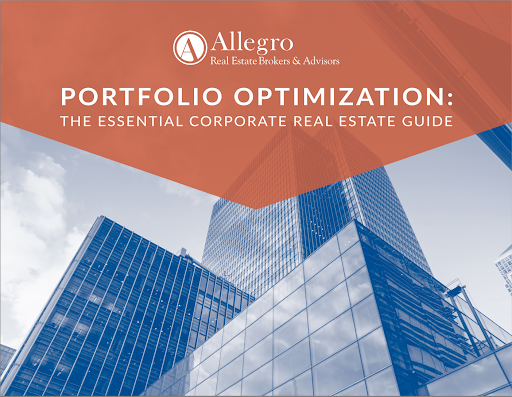Independent of your industry, real estate portfolio optimization is an essential element of your business’s financial health. To optimize your real estate portfolio, you must capitalize on efficiencies to ensure your portfolio is serving your overall business strategy. When you identify unsupportive assets (assets that do not benefit your overall strategy), it’s essential that you address these assets—often through a disposition process.
Many organizations dispose of unsupportive assets to reallocate the acquired funds to other, more immediate business objectives, pay off debt, invest in new ventures, and focus on properties that drive their business forward.
Typically, the buyer is responsible for conducting due diligence in a real estate transaction. However, Allegro recommends to our clients, when they’re sellers, to conduct their own due diligence before taking a property to market in order to be aware of deficiencies. The benefit to the seller is that they can then provide better information to prospective buyers, which removes unknowns, and increases pricing and the probability of closing.
Each phase of the commercial real estate disposition process is essential. That’s why our team of real estate experts has created this blog series, covering each stage of the process. Previous posts in this series include:
- What Is Disposition in Commercial Real Estate? Here Are the 5 Phases You Should Know
- Disposition in Commercial Real Estate: Choose Your Strategy
Once a disposition strategy is put in place, the seller enters phase two: due diligence and final pricing.
What Is Due Diligence in Commercial Real Estate?
During the disposition process, proper due diligence—primarily the responsibility of the buyer—ensures that the buyer spends adequate time exploring and inspecting the property, financial considerations, and compliance obligations with the intention of limiting and mitigating financial concerns or ambiguities.
Additionally, the seller may opt to conduct various due diligence activities prior to marketing the property and determining asking price. This helps uncover unknowns, enabling prospective buyers to make informed offers. Once under contract, aside from the seller providing pre-existing due diligence materials, the onus is on the buyer to then uncover any other unknown issues that could materially impact the closing of the transaction.
4 Types of CRE Due Diligence
Performing due diligence during a commercial real estate disposition requires a multifaceted exploration of the financial, physical, legal/title, and environmental components of the proposed property. While each transaction may look slightly different from the next, the following types of due diligence are typical for most transactions.
Be sure to reach out to a trusted commercial real estate advisor to help you plan and perform the rigorous due diligence required for a seamless transaction.
1. Financial & Operations Due Diligence
During financial and operations due diligence, all parties will review property financial statements. It is imperative that buyers understand the expenses and cash receipts that may be coming along with any real estate purchase. Sellers should have a strong understanding of operating expenses and net operating income, if applicable, and how they affect a buyer’s underwriting of the property and determination of proposed pricing. This may involve:
- Review of historical cash flow statements.
- Assess vendor contracts and liabilities.
- Confirm rent roll and other lease terms, which may include interviewing primary tenants of the property, if any.
- Audit historical expenses including property tax bills from the previous two or three years.
2. Physical & Structural Due Diligence
Physical and structural due diligence involves completing a full property inspection with a qualified building engineering or property manager, often referred to as a property condition assessment. Buyers should be concerned about the structural integrity of the asset they’re buying. They cannot afford to invest additional capital into a project without it being properly budgeted. Sellers should be concerned about any deferred maintenance and how it impacts pricing of the asset.
Structural features under review may include:
- HVAC equipment.
- Electrical systems.
- Plumbing.
- Roof systems.
- Structural walls.
- Window seal waterproofing.
- Elevator systems and equipment.
- Parking lot pavement.
- ADA compliance.
- Fire safety compliance.
3. Legal and Title
Legal and title due diligence is primarily conducted to confirm that the seller has sufficient authority to enter into the CRE transaction, and to address any liens, like charges, unpaid taxes, or easements. If they cannot, the buyer should be comfortable with what remains on title or the property after closing. The buyer is concerned that there are title encumbrances or physical encroachments that prevent the seller from conveying marketable title.
Title due diligence may also be required by financial lenders prior to approving the transaction. If there are title issues, the seller will be held accountable to eliminate encumbrances, typically negotiating with third parties, which could put the transaction at risk.
This type of due diligence may include:
- Review of title.
- Review of ALTA survey.
- Confirmation of zoning compliance.
4. Environmental Due Diligence
When conducting environmental due diligence, buyers typically commission a new Phase I/Environmental Site Assessment (ESA), or update an existing ESA to check for any hazardous materials that may have impacted the soil, groundwater, or building components. This type of due diligence also involves revisiting and assessing any environmental draft reports provided by the seller. In situations where the Phase I report identifies an issue, a Phase II will likely be warranted to determine the severity of the issue and the associated remediation costs.
If the seller has been operating from a property and suspects that there are any environmental issues, for example asbestos containing materials, it is warranted to conduct an ESA prior to taking the property to market. The seller should know the environmental condition of the property and associated costs to remediate. This information will impact the pool of potential buyers, the pricing, and the timing of closing.
Regardless of the transaction size, the parties must pay attention to all of the critical components that comprise a proper due diligence process. When working with an experienced advisor, like Allegro, sellers should feel comfortable that every transaction will be properly guided towards completion with proper attention paid to due diligence.
Learn More Strategies for Unsupportive CRE Assets
Commercial real estate optimization is fundamental to achieving your business goals and responding to new challenges. Learn more ways to address unsupportive assets in your CRE portfolio by downloading our free guide, Portfolio Optimization: The Essential Corporate Real Estate Guide.







